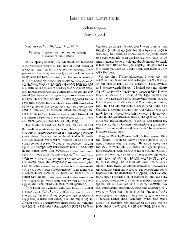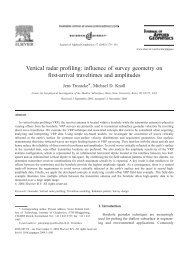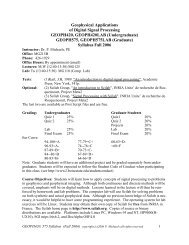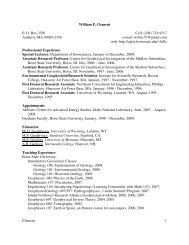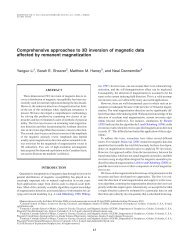Chapter 9 - Instructional Media: Chalkboards to Video - CGISS
Chapter 9 - Instructional Media: Chalkboards to Video - CGISS
Chapter 9 - Instructional Media: Chalkboards to Video - CGISS
You also want an ePaper? Increase the reach of your titles
YUMPU automatically turns print PDFs into web optimized ePapers that Google loves.
o<br />
Tests missed because of unexcused absences will be<br />
graded as 0 points.<br />
If you are grading attendance, be sure your class time is<br />
meaningfully used, or students will be resentful. Also, if you are<br />
grading attendance, do it in a systematic, regular manner.<br />
Students are very clever about ways <strong>to</strong> get on the attendance list<br />
without being in class.<br />
• Attitude or Effort -- Instruc<strong>to</strong>rs who choose <strong>to</strong> grade on<br />
attitude or effort will be pressed <strong>to</strong> justify decisions, so it might<br />
help <strong>to</strong> have specific criteria or tasks that will be related <strong>to</strong> the<br />
grade. Pop quizzes or assignments based on required readings<br />
may be used <strong>to</strong> motivate and document student preparation and<br />
attendance.<br />
Students also interpret grades as a measure of their self worth.<br />
They often relate how long and hard they worked at something<br />
that only demonstrates a modest understanding. Student effort<br />
must be recognized but should not be a consideration in<br />
assigning a grade. Statements such as -- “I can see how much<br />
effort you put in<strong>to</strong> this <strong>to</strong> attempt <strong>to</strong> understand it. I am happy <strong>to</strong><br />
be able <strong>to</strong> give you a B on the skills you have demonstrated.<br />
Keep up the good work” -- might help students understand that<br />
you recognize the subject is difficult for them, but because of their<br />
effort, they are performing at a good level.<br />
• Participation -- Some instruc<strong>to</strong>rs keep a running record of<br />
contributions during discussion sections or ask a student <strong>to</strong> do<br />
so. To avoid putting shy or inarticulate students at a<br />
disadvantage, an instruc<strong>to</strong>r might ask for written comments or<br />
questions <strong>to</strong> be submitted, or offer <strong>to</strong> be available for personal<br />
talks at other times.<br />
Fairness in<br />
Grading<br />
Grade Inflation<br />
When all the students in a class get A’s, or a high percentage of<br />
A’s and B’s, other professionals can interpret the distribution<br />
differently. Are these students so different from the general mix of<br />
students that they perform that much better in your classes Are<br />
you such a good teacher that all your students are performing at<br />
“very good” and “excellent” levels If true, then by all means give<br />
the grades with confidence. However, giving good grades <strong>to</strong><br />
students who do not earn them is not helpful either <strong>to</strong> the student<br />
or <strong>to</strong> your department. Sure, all students would like an A, but those<br />
who spend the time and effort <strong>to</strong> earn an A do not enjoy seeing<br />
those who merely slid by be given similar grades.<br />
The only way <strong>to</strong> avoid this situation is <strong>to</strong> have definite goals and<br />
standards for performance. A senior professor once advised, “You<br />
only get what you ask for and what you will accept.” Therefore, if<br />
Section: Student Assessment 196 <strong>Chapter</strong> 13: Grading



